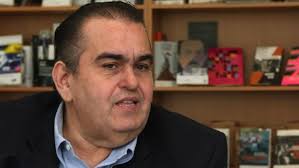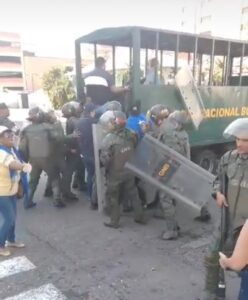Free speech activist Carlos Correa was released by authorities in Venezuela just past midnight Thursday, after being detained apparently without charges for more than a week as Nicolas Maduro was being in sworn in for a third term in office.
Correa, director of the freedom speech NGO Espacio Público, appeared before an anti-terrorism court during his detention, but any charges presented against him still have not been disclosed by authorities, Correa’s wife Mabel Calderín said.
Correa had been missing and his whereabouts unknown from Jan. 7 to 16. He had been stopped and forced by five hooded people into the back of an unmarked vehicle without license plates in downtown Caracas just two days before Maduro’s inauguration, which was not recognized by opposition parties and numerous international observers.
Authorities did not directly take responsibility for Correa’s disappearance until Wednesday, when a prosecutor told his wife Mabel Calderín that Correa had been summoned in court on January 9, Calderín said in a video posted on X.
“We thank all the people, organizations, governments and collectives who called for the release,” a statement by Espacio Público said after Correa’s release. “We continue to work in defense of human dignity.”
Correa had disappeared just prior to Nicolás Maduro’s inauguration to a third term as president of Venezuela. This is despite the fact that electoral authorities have not published the official tallies of the election held in July 2024.
In the days before and after the inauguration, which occurred on Jan. 10, repression against journalists increased. Journalistic organizations in the country have reported the arrest of at least four press workers in recent days, in addition to three others who were detained after the elections and remain in custody.
They have also recorded about five attacks.

Venezuelan journalist and human rights defender Carlos Correa has been missing since Jan. 7. (Photo: Espacio Público).
Members of the Venezuelan regime had confirmed that Correa was detained. Diosdado Cabello, Minister of Interior Relations, Justice and Peace, said that Correa is part of a "conspiracy plan," and attacked NGOs in Venezuela indicating that they are "money launderers that use resources from U.S. donors to conspire against the government.”
The Inter-American Commission on Human Rights granted precautionary measures to Correa on Jan. 10 after considering that was is in a “serious and urgent situation.”
In Maracaibo, a city located in western Venezuela, the National College of Journalists (CNP, for its initials in Spanish) has reported the highest number of arrests of journalists in recent days.
On Jan. 9, three press workers were arrested while covering a demonstration called by the opposition.
Journalist and university professor Edinson Castro told LatAm Journalism Review (LJR) that he was a block away from the demonstration recording people running after being repressed with tear gas. At that moment he was confronted by a member of the national police.
“I was insulted by the police while he complained to me about recording, as if that was a crime. It doesn't matter if you committed a crime or not, the only thing that matters is if they consider it to be that way," Castro told LJR. “Then they put me in the patrol car and they kept telling me atrocious things.”
Castro was detained for 13 hours and then released without charge.
Journalist Leandro Palmar and audiovisual technician Belises Salvador from university station Luz Radio FM were also detained while they were at the demonstration. However, they did not suffer the same fate as Castro.
“They took them by force and put them on a truck that the National Guard has to take detainees,” Joanna Barboza, director of CNP Zulia, told LJR.
On Jan. 11, they were presented before the criminal courts of Maracaibo and the judge in charge ordered both of them to be held. The crimes they intend to accuse them of are terrorism, criminal association, incitement to hatred and disruption of public order, Barboza said.
Barboza was also covering the Jan. 9 demonstration in Maracaibo, for the Frecuencia Noticias program team on the Fe y Alegría 88.1FM radio station, and was attacked along with her colleague Felipe López.

Journalist Leandro Palmar and audiovisual technician Belises Salvador from university station Luz Radio FM were detained on Jan 9. (Photo: Screenshot)
“I identified myself as a journalist at all times but a member of the national police attacked me violently, knocked down my cell phone while I was recording and crushed the wireless microphone with his boot,” Barboza said.
“And they hit my colleague, un rolazo, as we say in Venezuela, in his right leg. The blow was hard and there was no need because at no time did we resist,” she added.
On Jan. 9, journalist Julio Balza Maldonado, who is part of the Communications team of Vente Venezuela, a political party founded by opposition leader María Corina Machado, was also arrested, but in the Venezuelan capital.
Balza's family told the National Union of Press Workers (SNTP) that they do not know his whereabouts or the conditions of his arrest.
“He was arrested leaving María Corina's march. He, as a press worker, went with his brother and they were approached by some hooded men who took them away. They released my other son; They kept him, we don't know where, we don't know his conditions, we don't know anything," said Rosa Marlene Maldonado, the journalist's mother, in a video released by the SNTP.
The Union also denounced impediments to covering Maduro's proclamation on Jan. 10.
Accredited journalists were forced to remain in the Presidential Palace and only the cameramen were transferred to the National Assembly, where the swearing-in took place.
The Press and Society Institute of Venezuela reported three other journalists attacked around the country during the Jan. 9 demonstrations.
In Maracay, Aragua state, some motorists approached journalist Reynaldo Campins to demand his phone.
Journalist Randolfo Blanco, from Carabobo, had his phone snatched by a member of the Bolivarian National Guard while he was doing a live broadcast. And in the state of Táchira, announcer Frank Daza, director of Radio Binacional Informativa, was hit by unidentified individuals while covering an opposition rally.
VE sin Filtro, a Venezuelan organization that defends digital rights, reported that TikTok was blocked on all the main internet providers in Venezuela, days before the inauguration. The blocking lasted between six and eight hours.
They also reported blockings of the websites of at least 21 VPN services.
“This occurs, as on previous occasions, by orders of the telecommunications regulator in Venezuela, CONATEL, with the intention of preventing its use in the country,” the organization said in an article on its website.
And they reported the blocking of 33 public DNS servers, including the best known ones, such as Google Public DNS (8.8.8.8) and 1.1.1.1 from Cloudflare. This technique makes it difficult to access the Internet and makes it difficult for users to access certain websites, according to VE Sin Filtro.
For its part, the Internet blocking observatory NetBlocks reported that on Jan. 10 while Maduro was taking power, the messaging application Telegram was interrupted and users had problems accessing the service.